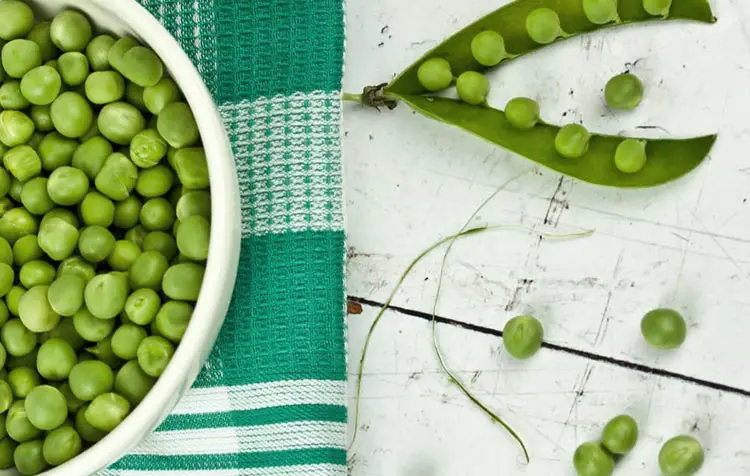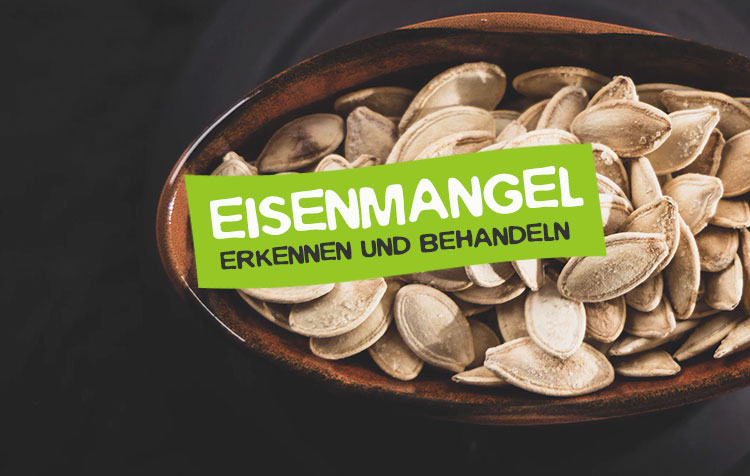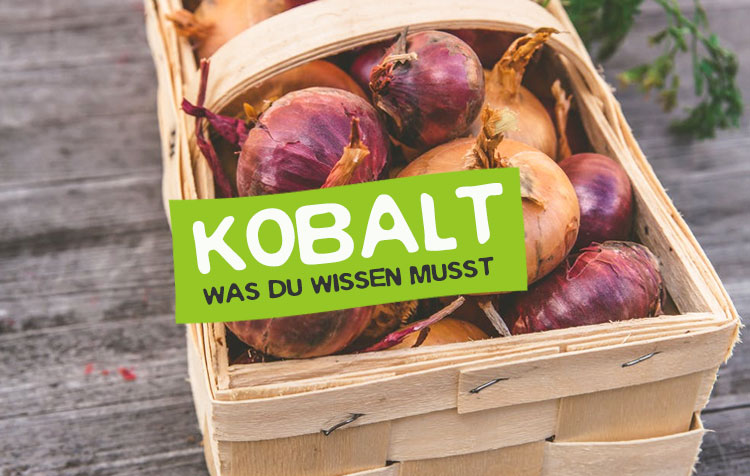You want to know more about folic acid or vitamin B9? Here's the most important information about the water-soluble vitamin B9, which is also called folate or folic acid.
We start with a brief profile, continue with the optimal intake, recommended daily requirement, function, risk of overdose or deficiency, to the best B9 sources and supplements. Finally, there is information on what to look for in a plant-based diet with regard to vitamin B9.
Here is in advance a short Overview for you:
Notice: This article is not a substitute for medical advice, but merely provides general information about folic acid. Please consult your doctor if you feel unwell or want to prevent health problems with medical care.
Folic Acid PROFILE AT A GLANCE
Assignment: Water soluble vitamins
Synonyms: Folate, vitamin B9, vitamin B11, vitamin M
Important for: Metabolic processes, growth, cell division1
Daily requirement: 300-400 µg/day from the age of 19.2,3,4
Overdose: Maximum intake for synthetic folic acid 1,000 µg5
Deficiency symptoms: Among other things, impaired cell division and DNA synthesis, anemia, elevated homocysteine levels
Food: Green leafy vegetables, green cabbage, eggplant,
Nutritional supplement: in the form of tablets, powder or drops
Absorb vitamin B9 optimally
First, I would like to bring a little more clarity to the various terms. Folate are naturally occurring folate compounds in the diet with a vitamin effect and are therefore also known as Vitamin B9 designated. At Folic acid is a synthetic, i.e. industrially produced form of the vitamin. The terms are derived from the Latin word folium (leaf) because the vitamin was first discovered in spinach.
The Bioavailability of folates is between 40 and 60 percent. With the Preparation attention should be paid to the fact that folates are sensitive to heat, light and oxidation. You can Vitamin C use to increase bioavailability, as it has a protective effect as an antioxidant.
Good to know: Folate-containing foods are best stored in an airtight container, protected from light, and then eaten raw.
What is the daily requirement of FOlat?
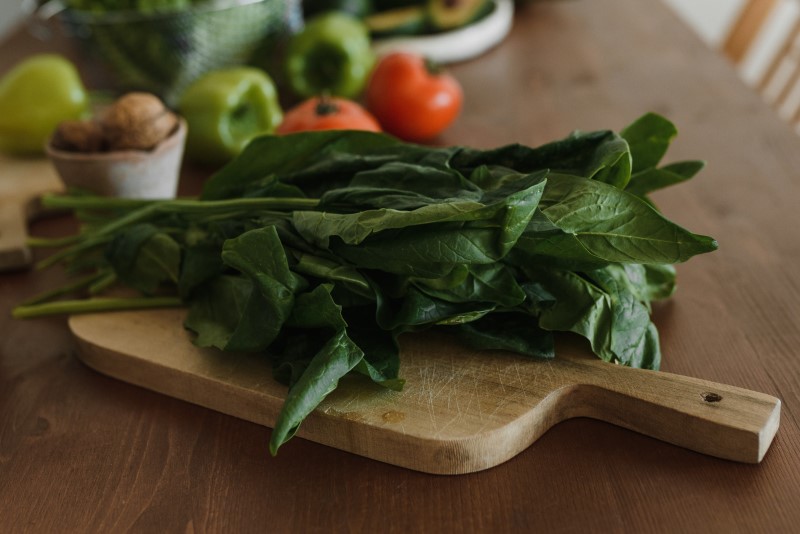
The general intake recommendations for folate are geared more toward avoiding deficiency symptoms rather than optimal health. Under certain circumstances, it may make sense to take more folate than recommended by nutritional societies. The reference values should therefore - as always - serve as a rough guide.
From Office of Dietary Supplements a daily intake of 400 µg folate is recommended for adolescents and adults from the age of 14.3 From the European Food Safety Authority (EFSA) a somewhat lower intake recommendation of 330 µg per day is given in comparison.4
Finally, here you will find the German Society for Nutrition (DGE) recommended reference values. These are broken down by age and shown in the following table in µg per day2:
| Age | Feeding recommendation |
| 1 to under 4 years | 120 |
| 4 to under 7 years | 140 |
| 7 to under 10 years | 180 |
| 10 to under 13 years | 240 |
| 13 years and older | 300 |
In addition, the three aforementioned nutrition societies pregnant women an increase in daily folate intake to 550-600 µg is recommended. For Lactating women an increased recommendation of 450-500 µg vitamin B9 per day also applies.2,3,4
What functions does folate perform in the body?
Folic acid is essential in the body for the DNA production and thus also contributes to the Cell division and to the Growth with. The water-soluble vitamin is also said to have a positive effect on the quality and quantity of sperm.
In addition, folate is present in a number of Metabolic processes involved. These include protein and homocysteine metabolism. Vitamin B9 interacts with Vitamin B6 and Vitamin B12The vitamins break down homocysteine and thus reduce the risk of developing arteriosclerosis.
Since atherosclerosis is a major risk factor for stroke, the preventive effect of folate was investigated in a study involving 20,000 subjects. It was found that the preventive administration of an antihypertensive combined with vitamin B9 reduces the risk of stroke. significantly reduces the risk of stroke.6
The Functions of folic acid short and to the point:
- Production of the hereditary substance
- Cell division and growth
- Improving the quantity and quality of sperm
- Metabolic processes
- Reduction of the risk of atherosclerosis
- Reduced risk of stroke
Tip: In a separate post, you'll learn how to use the Reduce the risk of heart disease in a targeted manner simply by following your heart.
Is too much vitamin B9 harmful?
Once again, a distinction must be made between natural folate and synthetic folic acid. Because for from the diet derived, Natural folate there are No maximum intake recommendation, as it does not exhibit any toxic effects.1,3,5
For Folic acid from food supplements or foods fortified with folic acid, however, EFSA has set a Tolerable Upper Intake Level (UL) of 1,000 µg per day.5 The main reason for this restriction is that a high folic acid level in patients with vitamin B12 deficiency improves the blood count to such an extent that the B12 deficiency is not detectable. The problem with this is that it does not prevent the neurological damage of vitamin B12 deficiency. Therefore, if you take care to get enough B12, even a folic acid intake higher than 1,000 µg can be harmless.
How likely is a FOlic acid deficiency?
In 2012, the DGE issued a statement saying that Germany is not a vitamin-deficient country and that the population is sufficiently supplied with vitamins.7 In one of the largest German nutrition studies, the National Consumption Study II, however, it was found that 79 percent of men and 86 percent of women do not reach the recommended reference values for the daily intake of folate.8 The fact that the test persons do not reach the intake recommendations does not yet mean a manifested deficiency, but it can result in health disadvantages.
An Irish study, analyzing data from 5,000 subjects aged 50 and older, concluded that 1 in 7 participants had folate deficiency and 1 in 8 had B12 deficiency.9 Thus should especially older people 50 and older keep an eye on their vitamin supply.
Reasons for B9 deficiency are mainly due to an unbalanced diet with few green leafy vegetables, cabbage and legumes, and a low proportion of raw vegetables. Other causes of deficiency are alcohol abuse, smoking, medication, and the contraceptive pill.3,10
Symptoms of deficiency are increased homocysteine levels and the associated increased risk of arteriosclerosis or strokes. Other symptoms include impaired purine and DNA synthesis, anemia, reduced antibody formation and immune deficiency, as well as sleep disorders, forgetfulness and depression. In pregnant women, B9 deficiency also leads to an increased risk of birth defects.
Which foods contain a lot of folic acid?
The valuable vitamin B9 is mainly found in green leafy vegetables, green cabbage and legumes to find. If you want to know more, you can find the best ones in the table below. Sources:
- Wheat Germ (350 µg per 100 gram)
- White beans (300 µg per 100 gram)
- Spinach, raw (192 µg per 100 gram)
- Peanuts (170 µg per 100 gram)
- Bean sprouts (160 µg per 100 gram)
- Lamb's lettuce (160 µg per 100 gram)
- Spinach, steamed (150 µg per 100 gram)
- Brussels sprouts (132 µg per 100 gram)
- Asparagus (128 µg per 100 gram)
- Hazelnuts (113 µg per 100 gram)
- Broccoli (110 µg per 100 gram)
Tip: To minimize preparation losses, you should eat the foods listed raw or cook them as briefly as possible.
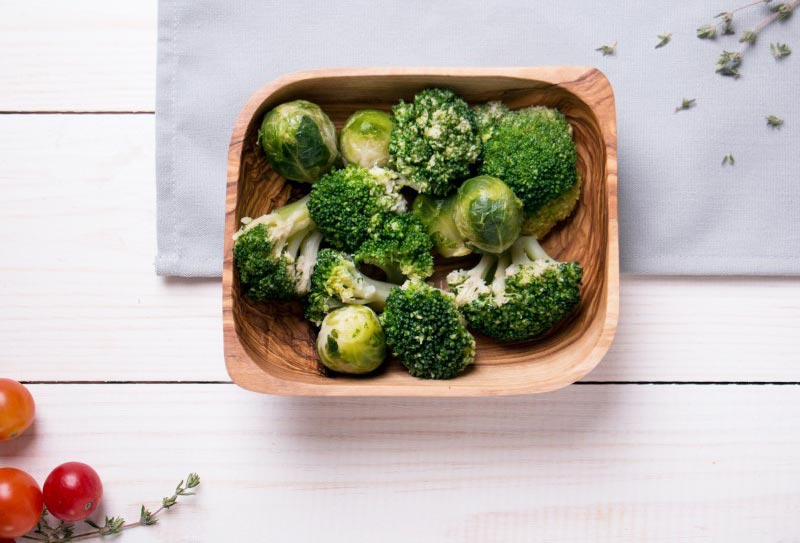
What is there to consider regarding folic acid in a vegan diet?
On average, vegans are better supplied with folic acid than vegetarians and mixed foodists. On the one hand, this is due to the fact that vegans eat more green leafy vegetables, various types of cabbage and legumes on average and, on the other hand, that dairy products and meat contain only very low amounts of folate. Consequently, vitamin B9 is recommended by the DGE not considered a potentially critical nutrient defined in vegan diet.11
Food supplement with vitamin B9
For whom is a dietary supplement with folic acid now useful? A special attention to their folate intake should Hypertensive patients, women of childbearing potential, and pregnant and lactating women. lay. Likewise, women who have Birth control pill as they are affected by low folate levels.
It is particularly problematic when women use the contraceptive pill and then want to become pregnant. Due to the pill, they have a low folate store, but need particularly high levels of vitamin B9 during pregnancy for correct embryonic development. Therefore the Supplementation of folate especially important for women of childbearing potential and pregnant women.1,3,10
But even people who do not belong to the above groups should pay attention to their folate intake. As a reminder, in the National Consumption Study II it was found that 79 percent of men and 86 percent of women have too low a vitamin B9 intake.8 If you regularly eat leafy green vegetables, green cabbage and legumes, you are probably well supplied with folate. Otherwise, however, supplementation may be advisable.
Which dietary supplements are recommended?
You can supplement folic acid specifically or take a vitamin B complex to directly cover other valuable vitamins as well. It can make sense to choose a vitamin combination, since vitamins B6, B9 and B12 work together in different metabolic processes.
A good one, vegan vitamin B complex in Capsules you get here*.
Vegan folic acid capsules in glass packaging you get here*.
Folic acid FAQ: The most frequently asked questions
How important is folic acid for the body?
Folic acid is essential and must be integrated into the diet in sufficient quantities. It helps in DNA production, metabolic processes and in pregnancy especially in embryonic development.
What kind of vitamin is folic acid?
Folic acid, also known as folate or vitamin B9, belongs to the B vitamin complex and is therefore a water-soluble vitamin.
How quickly does the body break down folic acid?
Folic acid is stored in the liver. If the body is hardly supplied with folic acid, the store is depleted within two to three months.
Is excess folic acid excreted?
Yes, the body excretes folic acid through the kidney if you take in more of the vitamin than you need.
What else is folic acid called?
Other names under which folic acid is known are folate, vitamin B9, vitamin B11 or vitamin M.
Green leafy vegetables for desirable folate levels
Your diet has a big impact on your B9 supply. With a wholefood diet with a high proportion of raw vegetables, lots of green leafy vegetables, cabbage and legumes, you generally do not have to worry about a possibly insufficient folic acid supply.
For a holistic health I also recommend you, in addition to a healthy diet, methods such as cold shower or Meditation to try out. These will make you fitter, healthier and more active in the long run!
If you thought of a question or suggestion about this article on vitamin B9 while reading, feel free to drop me a comment.
All the best,

P.S.: After reading this article, you can check out our Nutrient database find even more info about nutrients. Next, look at a post about the related vitamins B6 or B12 on. Have fun!
References:
1 Deutsche Gesellschaft für Ernährung e. V.: Selected questions and answers on folate. https://www.dge.de/wissenschaft/weitere-publikationen/faqs/folat/#metab. [18.08.2021]
2 German Nutrition Society: Folate, https://www.dge.de/wissenschaft/referenzwerte/folat/?L=0 [18.08.2021].
3 National Institutes of Health. Office of Dietary Supplements: Folate. Fact Sheet for Health Professionals, https://ods.od.nih.gov/factsheets/folate-HealthProfessional/. [18.08.2021]
4 European Food Safety Authority: Scientific Opinion on Dietary reference values for folate, https://efsa.onlinelibrary.wiley.com/doi/epdf/10.2903/j.efsa.2014.3893 [18.08.2021].
5 European Food Safety Authority: Tolerable Upper Intake Levels for Vitamins and Minerals, https://www.efsa.europa.eu/sites/default/files/efsa_rep/blobserver_assets/ndatolerableuil.pdf. [18.08.2021]
6 Yong Huo et al (2015): Efficacy of Folic Acid Therapy in Primary Prevention of Stroke Among Adults With Hypertension in China, JAMA, https://jamanetwork.com/journals/jama/fullarticle/2205876 [08/18/2021].
7 A. Bechthold, V. Albrecht, E. Leschik-Bonnet, H. Heseker (2012): DGE Opinion: Assessment of vitamin supply in Germany. In: Ernährungsumschau 59 (2012), pp. 324-336. Online: https://www.ernaehrungs-umschau.de/fileadmin/Ernaehrungs-Umschau/pdfs/pdf_2012/07_12/EU07_2012_396_401.qxd.pdf. [17.08.21]
8 Max Rubner Institute. J. Möhring, H. F. Erbersdobler (2008). National consumption study II - results report part 2. In: Lebensmittel-Warenkunde Für Einsteiger, (Springer), pp. 121-146. Online: https://www.mri.bund.de/de/institute/ernaehrungsverhalten/forschungsprojekte/nvsii/erg-verzehr-naehrstoffe. [17.08.2021]
9 M. Cohut (2018): Low B-12 and folate levels in mature adults 'of concern', https://www.medicalnewstoday.com/articles/322287#Older-adults-at-significant-risk. [17.08.2021]
10 Zentrum der Gesundheit: Folic acid: How to correct a deficiency, https://www.zentrum-der-gesundheit.de/ernaehrung/vitamine/weitere-vitamine/folsaeure. [17.08.2021]
11 Deutsche Gesellschaft für Ernährung e. V.: Supplement to the position of the German Nutrition Society with regard to population groups with special nutritional requirements, https://www.dge.de/wissenschaft/weitere-publikationen/dge-position/vegane-ernaehrung/?L=0 [17.08.2021].

